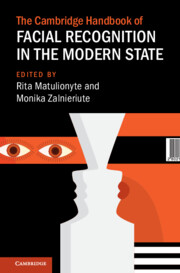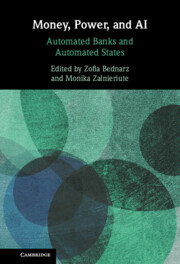The Cambridge Handbook of Facial Recognition in the Modern State
Part of Cambridge Law Handbooks
- Editors:
- Rita Matulionyte, Macquarie University, Sydney
- Monika Zalnieriute, University of New South Wales, Sydney
- format: Adobe eBook Reader
- isbn: 9781009321174
Find out more about Cambridge eBooks
Adobe eBook Reader
Other available formats:
Hardback
Looking for an inspection copy?
This title is not currently available for inspection. However, if you are interested in the title for your course we can consider offering an inspection copy. To register your interest please contact [email protected] providing details of the course you are teaching.
-
In situations ranging from border control to policing and welfare, governments are using automated facial recognition technology (FRT) to collect taxes, prevent crime, police cities and control immigration. FRT involves the processing of a person's facial image, usually for identification, categorisation or counting. This ambitious handbook brings together a diverse group of legal, computer, communications, and social and political science scholars to shed light on how FRT has been developed, used by public authorities, and regulated in different jurisdictions across five continents. Informed by their experiences working on FRT across the globe, chapter authors analyse the increasing deployment of FRT in public and private life. The collection argues for the passage of new laws, rules, frameworks, and approaches to prevent harms of FRT in the modern state and advances the debate on scrutiny of power and accountability of public authorities which use FRT. This book is also available as Open Access on Cambridge Core.
Read more- Highlights the diverse perspectives, concerns, and hopes in relation to facial recognition technology
- Outlines risks, challenges, and opportunities to mitigate and prevent harms brought about by FRT tools
- Available as Open Access on Cambridge Core
Customer reviews
Not yet reviewed
Be the first to review
Review was not posted due to profanity
×Product details
- format: Adobe eBook Reader
- isbn: 9781009321174
Table of Contents
Introduction: facial recognition in the modern state Rita Matulionyte and Monika Zalnieriute
Part I. FRT in Context: Technical and Legal Challenges:
1. Facial recognition technology: key issues and emerging concerns Neil Selwyn, Mark Andrejevic, Chris O'Neill, Xin Gu and Gavin Smith
2. FRT 101: technical insights Ali Akbari
3. FRT in 'bloom': beyond single origin narratives Simon Michael Taylor
4. Transparency of facial recognition technology and trade secrets Rita Matulionyte
5. Privacy's loose grip on facial recognition: law and the operational image Jake Goldenfein
6. Facial recognition technology and potential for bias and discrimination Marcus Smith and Monique Mann
7. Power and protest: FRT and public space surveillance Monika Zalnieriute
8. Faces of war: Russia's invasion of Ukraine and military use of FRT Agne Limante
Part II. FRT Across the Globe: Jurisdictional Perspectives:
9. Government use of FRT under European law Simone Kuhlmann
10. European biometric surveillance, concrete rules and uniform enforcement: beyond regulatory abstraction and local enforcement Paul De Hert and Georgios Bouchagiar
11. Lawfulness and police use of facial recognition in the UK: Article 8 ECHR and Bridges v South Wales Police Nora Ni Loideain
12. Does Big Brother exist? Face recognition technology in the United Kingdom Giulia Gentile
13. Facial recognition technologies in the public sector: observations from Germany Andreas Engeli
14. Central-Eastern Europe perspective to FRT regulation: a case study of Lithuania Eglė Kavoliūnaitė-Ragauskienė
15. An overview of facial recognition technology regulation in the United States Mailyn Fidler and Justin (Gus) Hurwitz
16. regulating facial recognition in brazil: legal and policy perspectives Luca Belli, Walter Britto Gaspar, Nicolo Zingales
17. FRT regulation in China Jyh-An Lee and Peng Zhou
18. Principled regulation of facial recognition technology: a view from Australia and New Zealand Nessa Lynch and Liz Campbell
19. Morocco's governance of cities and borders: AI-enhanced surveillance, facial recognition and human rights Sylvia I. Bergh, Issam Cherrat, Francesco Colin, Katharina Natter and Ben Wagner.
Sorry, this resource is locked
Please register or sign in to request access. If you are having problems accessing these resources please email [email protected]
Register Sign in» Proceed
You are now leaving the Cambridge University Press website. Your eBook purchase and download will be completed by our partner www.ebooks.com. Please see the permission section of the www.ebooks.com catalogue page for details of the print & copy limits on our eBooks.
Continue ×Are you sure you want to delete your account?
This cannot be undone.
Thank you for your feedback which will help us improve our service.
If you requested a response, we will make sure to get back to you shortly.
×

